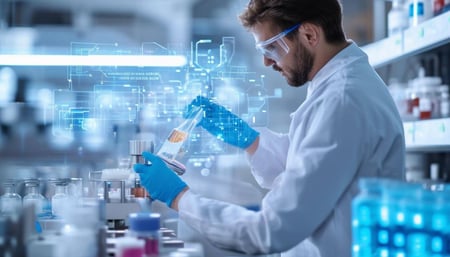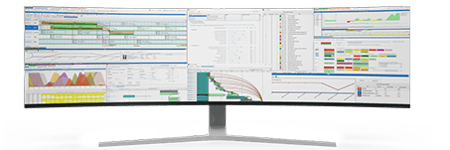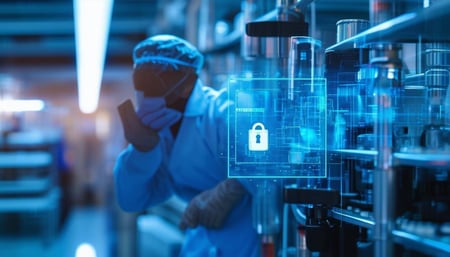Mastering Demand-Supply Matching Strategies in Packaging Manufacturing
Learn how Purchasing Managers in packaging manufacturing can master demand-supply matching with data-driven strategies and integrated planning tools.
Explore how purchasing managers in pharmaceutical manufacturing can drive digital transformation while prioritizing cybersecurity and compliance in system integration.
The pharmaceutical industry is rapidly embracing digital transformation, driven by the need for efficiency, precision, and agility in a highly regulated and competitive market. However, with this technological shift comes an ever-growing concern: cybersecurity. For purchasing managers in pharmaceutical manufacturing, the stakes are high. The decisions made in selecting and integrating technology solutions directly impact not only operational efficiency but also the security of sensitive data, intellectual property, and the entire supply chain.
In this blog, we will explore how purchasing managers can navigate the complex landscape of digital transformation, with a specific focus on integrating PlanetTogether with enterprise resource planning (ERP) systems like SAP, Oracle, Microsoft, Kinaxis, and Aveva, while maintaining robust cybersecurity measures. We’ll also cover key strategies to ensure that the integration of advanced planning and scheduling (APS) systems does not open the door to vulnerabilities, and how to work with IT and compliance teams to safeguard your organization.

The pharmaceutical manufacturing industry faces unique challenges—strict regulatory compliance, the need for precise batch tracking, quality assurance, and rapid response to changes in demand. As such, digital transformation is not just an option; it's becoming a necessity. Here are a few reasons why pharmaceutical manufacturers are increasingly investing in digital technologies:
Regulatory Compliance: Compliance with regulations such as Good Manufacturing Practices (GMP), the FDA’s 21 CFR Part 11, and ISO standards is critical. Digital solutions streamline documentation, data tracking, and reporting, reducing human error and enhancing compliance efforts.
Operational Efficiency: Automation and digital tools help streamline production planning, reduce waste, and optimize resources. This is crucial in an industry where delays or inefficiencies can mean lost revenue or, worse, drug shortages that affect patient care.
Supply Chain Visibility: The complexity of pharmaceutical supply chains makes it difficult to track raw materials, manage inventory, and forecast demand accurately. Digital solutions provide real-time visibility into supply chain operations, improving decision-making and responsiveness to market changes.
Innovation and R&D: Pharmaceutical companies must continuously innovate to remain competitive. Digital transformation accelerates research and development processes by leveraging data analytics, artificial intelligence (AI), and machine learning (ML) to optimize product development cycles.
As purchasing managers, your role in this transformation is pivotal. The systems and technologies you choose must not only support operational goals but also ensure that the company remains secure from the growing number of cyber threats targeting the pharmaceutical sector.
![]()

Integrating advanced planning and scheduling (APS) systems like PlanetTogether with ERPs such as SAP, Oracle, Microsoft Dynamics, Kinaxis, or Aveva is a powerful way to boost efficiency in pharmaceutical manufacturing. These systems offer real-time data synchronization, allowing manufacturers to optimize production schedules, manage capacity, and balance supply with demand.
However, integration is not without its challenges. One of the most critical concerns is cybersecurity. Pharmaceutical manufacturers are prime targets for cyberattacks due to the sensitive nature of the data they handle—clinical trial data, proprietary formulations, and patient information are all at risk.
Let’s explore how you can successfully integrate PlanetTogether with ERP systems while keeping cybersecurity at the forefront.
Integrating APS and ERP systems is essential for seamless communication across departments—from production and procurement to inventory and distribution. For instance:
SAP Integration: SAP’s ERP system is widely used in pharmaceutical manufacturing for its robust supply chain management and compliance features. Integrating PlanetTogether with SAP ensures real-time data flow between production schedules and procurement processes, enabling more accurate material planning and inventory control.
Oracle ERP: Oracle’s ERP solutions are known for their scalability and cloud capabilities. Integration with PlanetTogether can help pharmaceutical manufacturers optimize batch production, ensure proper resource allocation, and maintain regulatory compliance across global operations.
Microsoft Dynamics 365: Microsoft’s ERP platform is highly customizable and integrates well with other Microsoft tools. When combined with PlanetTogether, it enables better planning, reduces downtime, and helps pharmaceutical companies stay agile in response to market shifts.
Kinaxis: This supply chain management platform focuses on rapid planning and integrated decision-making. Pairing it with PlanetTogether allows for more responsive and accurate production planning, particularly in fast-paced pharmaceutical environments where demand can change unexpectedly.
Aveva: Known for its industrial software solutions, Aveva’s integration with PlanetTogether supports real-time monitoring and control of manufacturing processes, enhancing efficiency while ensuring compliance with stringent pharmaceutical regulations.
When integrating these systems, it's crucial to recognize that each point of connection presents a potential vulnerability. Purchasing managers should work closely with IT and cybersecurity teams to ensure that integration doesn’t compromise the company’s security posture. Here are some key cybersecurity measures to consider:
Data Encryption: Ensure that data is encrypted both in transit and at rest. This includes sensitive production data, proprietary formulations, and any personal health information (PHI) that might be part of the supply chain.
Access Controls: Implement strict access controls to ensure that only authorized personnel can access specific systems and data. This includes using multi-factor authentication (MFA) and role-based access control (RBAC) to limit exposure to sensitive information.
Vulnerability Assessments: Regularly conduct vulnerability assessments and penetration tests on integrated systems. This will help identify potential weaknesses that could be exploited by cybercriminals.
Patch Management: Ensure that all systems, including PlanetTogether, your ERP, and any associated software, are regularly updated and patched. Cybercriminals often exploit known vulnerabilities, so timely updates are essential.
Monitoring and Incident Response: Set up real-time monitoring for suspicious activity across integrated systems. Having an incident response plan in place is critical for quickly addressing any breaches or cyberattacks that may occur.
Vendor Security: Assess the cybersecurity posture of all vendors involved in the integration. This includes PlanetTogether and the ERP providers, as well as any third-party software or hardware vendors. Make sure they comply with industry best practices and standards for cybersecurity.

Pharmaceutical companies face several unique cybersecurity risks, which purchasing managers must account for when selecting and integrating digital solutions. Some of the most pressing risks include:
Pharmaceutical manufacturers are rich targets for cybercriminals due to the high value of intellectual property (IP), including drug formulations, research data, and proprietary processes. Hackers may seek to steal this information for competitive advantage or financial gain. Integrating new systems must not expose this data to unauthorized access.
The pharmaceutical industry is subject to stringent regulations such as the FDA’s 21 CFR Part 11, which governs the electronic records and signatures used in drug manufacturing. Any cybersecurity breaches could result in non-compliance, fines, or loss of business licenses. Ensuring that your digital systems comply with these regulations is essential for avoiding legal and financial repercussions.
As pharmaceutical supply chains become more complex, they also become more vulnerable to cyberattacks. Attackers may target suppliers, logistics providers, or even third-party vendors that have access to your systems. Securing the entire supply chain requires a comprehensive approach to cybersecurity that includes all partners and vendors.
Ransomware attacks are on the rise, and pharmaceutical companies are particularly vulnerable due to their reliance on continuous production processes. A successful attack could halt manufacturing, delay product delivery, and lead to significant financial losses. Integrating new systems like PlanetTogether and an ERP increases the attack surface, making cybersecurity measures all the more critical.
To successfully integrate advanced planning and scheduling systems with ERP solutions while maintaining cybersecurity, here are some best practices that pharmaceutical purchasing managers should follow:
As a purchasing manager, you play a key role in selecting technology vendors and solutions. However, it’s important to collaborate closely with your company’s IT and cybersecurity teams to ensure that the technologies you choose meet security standards and comply with regulatory requirements.
Before proceeding with any integration, conduct a thorough risk assessment to identify potential vulnerabilities. This should include an evaluation of the security features of both PlanetTogether and the ERP system you are integrating, as well as any third-party software or services involved.
When selecting vendors for integration, prioritize those that have demonstrated a strong commitment to cybersecurity. Look for certifications such as ISO 27001, SOC 2, or compliance with NIST cybersecurity standards. These certifications indicate that the vendor follows best practices for data security and risk management.
A zero-trust security model assumes that threats can come from both inside and outside the organization. Implementing zero trust means that all users and devices, even those inside the network, must be authenticated and authorized before accessing any system or data. This approach significantly reduces the risk of cyberattacks.
One of the most common causes of cybersecurity breaches is human error. Regularly training employees on cybersecurity best practices—including recognizing phishing attempts, using strong passwords, and following secure protocols—can go a long way in protecting your organization from attacks.

As a purchasing manager in a pharmaceutical manufacturing facility, you play a crucial role in not only driving digital transformation but also ensuring that the technologies you procure align with the company’s cybersecurity goals. Here are some additional ways you can contribute to the security of your organization:
Establish Clear Cybersecurity Criteria for Vendors: When evaluating potential vendors, make cybersecurity a top priority. This includes asking about their security certifications, encryption practices, and incident response capabilities. A vendor’s commitment to cybersecurity should be just as important as their product’s features and functionality.
Collaborate with Legal and Compliance Teams: Work closely with your organization’s legal and compliance teams to ensure that any contracts with vendors include strong cybersecurity clauses. This may involve specifying data protection requirements, incident notification timelines, and penalties for non-compliance.
Monitor Ongoing Cybersecurity Performance: Once a vendor has been selected and the system has been integrated, your job isn’t done. Continually monitor the vendor’s cybersecurity performance and ensure that they are meeting their commitments. This includes reviewing security audit reports and ensuring that regular updates and patches are being applied.
Be Proactive in Cybersecurity Education: Take the initiative to educate yourself and your team on the latest cybersecurity trends and best practices. By staying informed, you can make better decisions when selecting and implementing technology solutions.
Advocate for Cybersecurity Budgeting: Cybersecurity is not an area where corners should be cut. Advocate for the necessary budget to implement and maintain strong cybersecurity measures, especially during digital transformation projects. The cost of a breach—both financial and reputational—far outweighs the upfront investment in security.
Digital transformation is revolutionizing pharmaceutical manufacturing, offering unprecedented opportunities to improve efficiency, compliance, and innovation. However, the journey towards digital integration comes with significant cybersecurity challenges. As a purchasing manager, your role in selecting and integrating systems like PlanetTogether with ERP solutions such as SAP, Oracle, Microsoft, Kinaxis, or Aveva, is critical to ensuring that your organization reaps the benefits of digital transformation while keeping sensitive data and operations secure.
By following best practices in cybersecurity, collaborating with key stakeholders, and staying informed about the latest threats and technologies, you can play a pivotal role in driving both innovation and security in your organization’s digital transformation journey. The future of pharmaceutical manufacturing will be shaped by those who can successfully navigate the intersection of technology and security—making purchasing managers indispensable to the process.
In the end, digital transformation is not just about adopting new technologies; it’s about creating a resilient, secure, and efficient manufacturing environment that can adapt to future challenges while maintaining the highest standards of safety and compliance.
Are you ready to take your manufacturing operations to the next level? Contact us today to learn more about how PlanetTogether can help you achieve your goals and drive success in your industry.
Learn how Purchasing Managers in packaging manufacturing can master demand-supply matching with data-driven strategies and integrated planning tools.
Discover effective strategies for change management in scheduling implementations for packaging manufacturing. Learn integration tips for...
Discover how integrating advanced planning solutions like PlanetTogether with ERP, SCM, and MES systems revolutionizes chemical manufacturing.
Be the first to know about new B2B SaaS Marketing insights to build or refine your marketing function with the tools and knowledge of today’s industry.